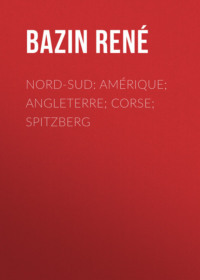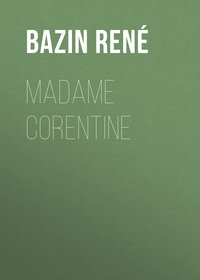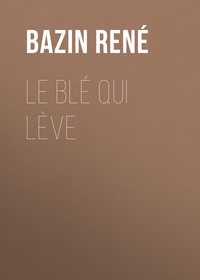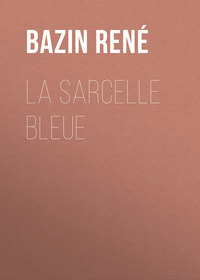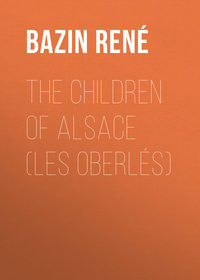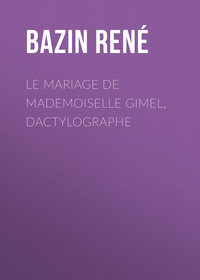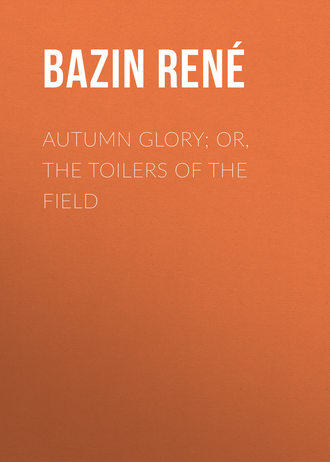 полная версия
полная версияAutumn Glory; Or, The Toilers of the Field
"My Rousille, Jean Nesmy has come!"
With perfect self-control she did not turn her head, made no movement; feeling herself to be spied upon, she had all the courage of her ancestors whom peril had ever found ready. Scarce opening her lips as if only breathing to calm her beating heart, she said to him who had rustled the leaves behind her:
"Beware! Mathurin is watching us."
"I know, he has already seen me."
"Then, go quickly! Come back later."
"When?"
"To-night, in the barn; when I put my candlestick on the window-sill."
Mathurin was hurrying across with the aid of his crutches to satisfy himself that he had seen a man's figure among the shadows of trees in that opposite group. Jean Nesmy meanwhile slipped away amid the undergrowth, and through the lonely copses. Round the steps, already in darkness, loud talking and laughing rose from the diminished crowd.
"I will have it. That's what I want," was heard in Lumineau's strong voice. The auctioneer was offering a walking-stick, with horn handle bound with a gold ring.
"That depends, my good man," was the reply, amid the jibes of the townspeople of Chalons, "that depends! To say 'I will have it' in an auction is not enough. What price do you put on it?"
"Two francs," said a broker.
"Five francs!" cried the farmer. Now no one laughed; the bid was an unusual one. Toussaint Lumineau had made it greatly to prevent competition, but also, as he would have said, from a spirit of bravado to prove that the tenant was not ruined like his master. Mounting the lower steps he reached up a crown piece, seized the cane, and, not venturing to lean upon it, tucked it under his arm, and slouched away from the remaining group of bargainers who were greedily snapping up odd remnants of the furniture of La Fromentière, hastily priced, given for next to nothing. Skirting the excited cluster of buyers, he went towards the group of trees where Mathurin had again taken up his post.
"Let us go," he said, "I have made my purchase. M. Henri's walking-stick."
"You paid too much for it," said the cripple.
"My poor lad," returned the farmer reproachfully, "he would have given it to me had he been there. I paid that price that no one should dispute it with me… All those fellows would have made game of me, had I not! – "
And with a movement of the shoulder he signified the notary, the auctioneer, the invisible agents of the law, who to his excited fancy had had a hand in the proceedings now coming to an end. Moderating his pace so as not to hurry Mathurin, whose crutches struck against the mole-hills on the lawn, the farmer crossed the broad expanse where the blue mist thickened. They could hear the cracking of whips; see the red light of lanterns passing along the leafless woods, the frightened wood-pigeons circling over head. Rousille saw her father coming. She had remained in the same place sitting on the bench, joyous at heart, but with somewhat too much of love's dream in her eyes, for her father asked severely:
"What is it, child? This is no day for laughter."
"Nothing," she answered, rising.
"Then walk on in front," put in Mathurin. "You might be meeting someone."
And she went down the avenues, then along the path by the leafless hedges in front as she had been hidden. Her white coif turned neither to the right nor to the left; but proud as one enduring for her love, she walked on with elastic step down the hill towards the elm-trees of the farmstead, and her eyes gazing fixedly into the gathering night – those eyes which none could read, gazing at everything, seeing nothing, were filled with tender musings. She entered her domain, and began to pour over the bread the soup which had been simmering in her absence. The men stayed without, talking. When they came in she felt sure that she had been again betrayed by Mathurin, and that her father was angry with her. André came in last, at about eight o'clock. The farmer had proposed waiting supper until his return, and he and Mathurin had sat in the chimney-corner warming themselves, by turns taking and trying the cane of M. Henri as they talked over the sad events of the day: the men who had come from Sallertaine to bid, how they had heard the battens nailed up again across the lower windows as they came away; the lights they had seen wandering along the corridors of the upper floor as in the good old days when the great white house was full of guests.
"Our masters will never come back now," said Toussaint Lumineau. "And I, who always believed in them! This is the end!"
"The end!" repeated André, as he came in at the door from the outer darkness. "I am glad not to have seen it."
The good-looking young Maraîchin seemed tired and troubled; his eyes were brilliant as if about to shed tears. Toussaint Lumineau thought that the shame of this public auction, so painful to him, had affected his son in like manner, and had been the sole cause of his long absence.
"Sit down, Driot," he said, "you must be hungry. The soup is ready."
"No, I am not hungry," replied André.
"Nor am I," returned his father.
Mathurin alone, dragging himself to the table, ladled out a plate of soup; while his father remained sitting beside the fire, and Driot stood leaning against the projecting chimney-corner, looking alternately at his father and brother.
"Where did you go?" asked the farmer.
André made a sweeping gesture:
"From one to the other. To your friend Guerineau, of La Pinçonnière; to the miller of Moque-Souris; the Levrelles; the Massonneau…"
"A good fellow, le Glorieux," interrupted the farmer; "worthy family his."
"I saw the Ricolleaus of Malabrit too."
"What, you went as far as that?"
"The Ertus of La Parée du Mont – "
Toussaint Lumineau looked straight into his son's clear eyes, trying to understand.
"What led you to go and see all these people, my boy?"
"An idea" – no longer able to endure his father's inquiring look, his eyes sought the dark corner wherein stood the bed – "an idea. Well then, going along, I thought I would go as far as La Roche and see François."
"François?" murmured the farmer. "You are like me then, dear lad, your thoughts are often with him?"
Slowly the young man nodded his head, as he answered:
"Yes, this evening especially; this evening, more than any evening of my whole life, I would have liked to have him beside me."
André's words were spoken with such strong emotion, with so mournful a solemnity, that Mathurin, who had not known the date of André's departure, understood that the time had come, and that his brother had not many more minutes to remain in La Fromentière.
The blood rushed to his head, his lips half opened, a violent fit of trembling seized him, while his eyes stared fixedly at André. There was an unwonted animation in those eyes of his, for, while they expressed triumphant pride, there was also, in that supreme hour, something of pity and affection, perhaps of remorse. André knew that they bade him farewell. The father, meanwhile, had drawn up his chair to the table, and raising the cane horizontally to the level of the lamp, that André might the better see it, was caressing the gold ring with his fingers, none too clean from the day's toil. He imagined that his son's thoughts were again with the present, or like his own, were embracing the same future.
"See," said he, "what I bought as a souvenir of M. Henri. How often he has knocked against my door with the point of this cane, tap! tap! tap! 'Are you there, my old Lumineau?' André, when you are the master of La Fromentière – "
At these words the young man, who was standing behind the farmer, felt all his courage give way. Unable to restrain his tears, and fearing lest his father should turn towards him, he retreated silently towards the door.
Toussaint Lumineau had noticed nothing; he continued: "When you are the master at La Fromentière, you will see no more of the family. I do not believe that the farmstead will be sold. I greatly hope not, but our Marquises will not come amongst us again. My lad, the new times you will be living in will not be like those I used to know!"
Now Driot's tears fell fast as he looked at the old walls worn with the shoulders of many a Lumineau past and gone.
"Do not distress yourself, dear boy. If the masters go, the land remains." Driot's tears fell fast as he looked on the rosary of Mère Lumineau, hanging at the head of the bed.
"The land is good, though you have spoken ill of it, and so you will find out."
Driot's tears fell as he looked at Mathurin.
"You will do your best for it; and it will do its best for you!"
Driot's tears fell fast as he looked at his father, still fondling the light wood cane. He gazed for some time by the light of the lamp on the tired hands, the horny hands, seamed with scars gained working for his family for their support and education – the hands that had never known discouragement, and, impelled by respect and grief, he did a thing unknown at La Fromentière, now that the sons were grown up and the mother dead; he came close in the shadow behind his father, leant over him, and kissed the old man's wrinkled brow.
"Dear boy!" said Toussaint Lumineau, kissing him in return.
"I will be off to bed," murmured André. "I am done up."
He seized Mathurin's hand in a warm, hurried clasp. But he took some time to go the ten paces which separated him from the door leading into the kitchen where Rousille was washing up her dishes. As he shut the door he looked back once more into the room. Then he was heard talking to his sister. Then he was heard no more.
Deep night enveloped the farmstead, the last on which the roof of La Fromentière would shelter Driot. An hour after, any late wanderers along the road, seeing the mass of buildings standing out from the trees, darker even than the enveloping fog and as silent, would surely have thought that all within were sleeping soundly. But, save the farm-servant, all within were wide-awake.
Mathurin, greatly excited, had not ceased talking and turning restlessly. The light extinguished, talking still continued between father and son, whose beds were ranged, near each other, beside the wall. Not daring to speak of André's flight, the idea of which was ever present with him like a persistent nightmare, the cripple turned feverishly from one subject to another, and his father found it impossible to calm him.
"I assure you I did see the Boquin. I was some distance from him, but I detest him too much to make any mistake about the fellow; he has a sly way of running about like a ferret. He wore a brown suit, and had something tawny in his hat, like oak leaves."
"Go to sleep, Mathurin, you must be mistaken."
"Yes, of course they were oak leaves. When he was here he used to stick them in his hat every now and then out of bombast, to show that his province was richer and more wooded than ours. Ah, the dannion! If I could but have run!"
"You would not have found him, my poor boy! He is at home in his Bocage. What should have brought him to the Marquis' sale?"
"To see my sister, of course! He may even have spoken to her for all I know, for it was too dark for me to see Rousille plainly."
The father, lying in his large canopied bed, sighed, and said:
"Always your sister! You worry yourself too much about her. Go to sleep, Mathurin. They would not dare to speak to each other; they know I should not allow it."
The cripple was silent for a few seconds, then his mind reverted to the events of the day; he enumerated the neighbours who had spoken to him, and what they had said about the probable sale of La Fromentière; then, impelled by the one master-thought, he recapitulated the things to be done for the improvement of the farmstead, the conditions of the fresh lease to be arranged for with the owners, and added:
"You do think me better, don't you? My back is straighter. I am not so short of breath. Did yoo notice, as we came home to-night, how at every step I used my legs without needing my crutches?"
Several times in the middle of a sentence he had stopped short to listen, seeming to hear that which in imagination he never ceased to see; Driot for the last time leaving the room at the end of the house; Driot going stealthily through the courtyard that his footsteps might not be heard on the gravel; Driot passing the door close by, and going away for ever.
Towards eleven o'clock, Bas-Rouge, who had growled at times earlier in the night, began to bark violently to the right of the yard.
"What is the matter with him?" exclaimed Toussaint Lumineau; "one would think there were people moving about in our lane."
Mathurin, growing cold, silently raised himself on his elbows. After a minute the farmer resumed:
"Do you hear how our dog is barking? There certainly must be someone near."
"Father," returned Mathurin, "he is as mad as a March hare at this time of year. I think he sees bernacles flying in the air." The barking sounded nearer, not angry but joyous, as of a dog being taken for a walk. Then a footstep was distinctly heard, and the animal began to howl.
"They are throwing stones at Bas-Rouge," exclaimed the farmer. "I must go."
"No; do not go. I will not have you go! Stay, father, stay!"
"Why?" asked Toussaint Lumineau. "I have done it scores of times before, and have taken no harm."
Sitting on the side of his bed, the old peasant listened yet for a few seconds, before hastily putting on his breeches and running to the door. A thought flashed through Mathurin's mind:
"It is André. I have but to say one word, and my father will be with him in time. Shall I?" Six years of suffering and of being in subordinate position to the younger ones, answered: "No!" and letting himself fall back on his pillow, he said, as if reassured:
"It is not worth the trouble. The sounds are already further off."
And, in truth, Bas-Rouge must have run out into the lane towards the main road. His barks were more faintly heard and at intervals; he evidently was seeing the intruder off the premises.
The farmer lay down again, and no longer hearing Mathurin move, fell asleep. It was a little past midnight.
At that hour Rousille was still at work in her room, with doors bolted and window shut, waiting for him who had promised to come. The thought of seeing her lover once more, of what she should say to him, and the idea that there might be some danger to Jean Nesmy, were he surprised by her father, had occupied the long hours during which the murmur of voices from the adjoining room had not ceased to reach her. "What can they have to say to each other?" she thought. On the side towards the barn she had carefully closed the shutter of a narrow little window, cut in the thickness of the wall, breast high, and protected by an iron bar. Sitting on the chest at the foot of the bed, she was hemming some coarse kitchen aprons. The candle standing near lit up the bowed head of the young girl and the more distant panels of the five wardrobes, the polished pillars of the bedsteads, and the sides of the chests, each of which gave a different softened reflection; there was the violet of wild cherry wood, the dark-red of the cherry-tree, the golden-brown of walnut and oak, and finally the ghostly reflection of one, made for a somewhat eccentric great grandmother, of the finest ash wood; and in the same room and atmosphere that had surrounded her ancestresses, industrious as was their descendant, now sat Rousille, the last daughter of the Lumineaus, with eyes modestly bent upon her needlework.
Rousille was never idle. However, in this self-imposed night-watch, it sometimes happened that she would pause with thread outstretched, or would rise and go with slippered feet to listen at the door of the room nearest to the house-place whence voices were still audible.
When nothing more was heard, neither the barking of the dog, nor the vague sound of voices, she still listened, but she had ceased to ply her needle. Looking round the room with the eye of a housekeeper, she thought:
"Will he find it in good order, and as he would like his house to be kept?" Rousille tied the kerchief she wore as protection from the cold more closely; then a little shudder of fear ran through her at the thought that her father might suddenly appear; and her face grew grave and stern, as before, when she had had to do battle for Jean Nesmy; then, rising, she placed her candlestick on the deep window-sill, which by reason of the thickness of the wall was triangular, like the loophole of a fortress. After that she opened back the shutter on its hinges. A breath of icy fog enveloped the flame, nearly extinguishing it; almost on tip-toe, with both hands shading her eyes, Rousille endeavoured to distinguish objects from out the darkness. Was he there? She only saw the bare branches of two gooseberry-bushes trained against the wall. There was no sound of footsteps; no sign of anyone; she only heard the dull thud of mist-drops falling from the slates on to the turf beneath. A minute passed.
Suddenly the branches were pushed aside, a dark head emerging from the total darkness was framed in the window between the wall and the iron bar. The face was pale, but the eyes laughing, half-closed, dazzled by the candle-flame.
"I thought," said Jean Nesmy, "that you were not coming. I was chilled to the bone. I was going!" He looked so radiant as he said it, his eyes gradually opening, revealing the rapture of perfect delight.
Rousille, more grave, for she had within her the recollection of her past meditations, said:
"We must talk quickly. Father has only just fallen asleep. If he were to awake! If he were to come upon us!"
But Jean Nesmy seemed in nowise to share her fears. Nor did he look about the room to see if all was in order. He only looked at Rousille, so agitated under her little coif. The light placed between them illuminated their eyes to the very depths.
"You are as pretty as ever," replied the lad. "One might well walk miles to catch a sight of you! Mother Nesmy did not want me to come on account of the expense; but I said to her: 'I would rather go without my bread,' and it was true, my Rousille."
She could not help smiling.
"You always know how to pay compliments, Jean Nesmy; and really I see no change in you."
"There is none," he returned, showing his white teeth.
And now she forgot all her previous uneasiness, and it seemed to them both, as though they had never been apart, so natural was the interchange of ideas; the candle quivered under the mutual stream of question and answer.
"Tell me, Rousille, how are things going? Are you happy?"
"Not very. At La Fromentière we have more sorrow than happiness. Now, as you know, our master the Marquis has had all his furniture sold. Such a pity!"
"Our nobles of Le Bocage would not have done such a thing," said the Boquin, throwing back his head.
"Besides," resumed Rousille, "since François left us nothing goes right. Driot is inconsolable at his absence."
"Even now?"
"Even now. We thought him so lively when he first came home. Well, this evening he actually cried. Why could it have been? Was it fear that the farm would be sold over our heads? Was it anything else? With him one never knows."
"Perhaps he is thinking of a sweetheart about here?"
"I wish indeed it were so, Jean, for his sake and ours, because his marriage would be the signal for our own. You see, all our hope is in André. I have thought many a time, indeed why not tell you – every day since the one on which you went: If André does not marry, my poor Jean, I shall be quite white-haired before our banns are published in your church and mine. Father will not let me go unless there is a housekeeper here to take my place. And as for our coming to live here with Mathurin – he hates us both too much. There would be bad blood at La Fromentière. Father would never put us on the farm with Mathurin."
"Does he ever speak of me when he is ploughing?" asked Jean.
"I never go into the fields," replied Rousille. "But one evening I heard him say to my eldest brother, 'Do not speak ill of the Boquin, Lumineau! I refused him my daughter, and in that I did well; but he was a good worker, he had a love for soil.'"
Behind the iron bar the face of the former farm-hand coloured with pride.
"It is true that I loved everything about the place for your sake, Rousille. And so André will not marry?"
"I do not say that. He is still in such low spirits; but time will cure that. We shall have him on our side, that good André; he spoke so kindly to me the day of the letter. He promised to help me; but did not explain in what way."
"Did he mean soon?"
"I think so," said Rousille, "for his manner was very decided, and he was very sure about the step he was going to take."
Suddenly she lowered her voice – "Did you hear that?" she asked.
"No, nothing."
"Something moved in the bakery."
"Look at me, Rousille. Nothing moved," returned Jean.
Obedient, victorious over all fear for love of him, she bent once more towards the window, even began to laugh as she said:
"It is easy to see that you have no fear of anything. Where were you hidden, just now, before I opened the shutter?"
"Among the layers of straw. The wind was as keen as on one of my worst wild-fowl expeditions; it stupefied me, and seeing no light I must have fallen asleep for a while."
"Really? and what woke you?"
"Bas-Rouge, going after your farm-servant."
"Going after the farm-servant?" exclaimed Rousille in astonishment. "I heard the dog bark, but I thought he was after a tramp, there are so many about on these roads; or that he had recognised you – "
"You know very well, Rousille, that he never barks at me, since I used to take him out with me when I went shooting. No, I am certain that it was the farm-servant… I heard the latch fall, and the distinct sound of footsteps on the gravel at the back of the house. I tell you it was the servant, or else your brother… I am convinced that a man went out from here."
She blanched a little and then drew herself up:
"No!" she replied, "André does not go out shooting like you; nor does he go off to Chalons as François did! Can Mathurin have got up to spy upon us while father was asleep? Oh, do take care of yourself, Jean Nesmy! Listen!"
Seizing the candlestick from the window-sill, she held it out at arm's-length towards the other end of the room, the light shining on the polished furniture as she moved it.
"You are right, someone is moving about in the bakery," said Jean Nesmy. Now the door was gently pushed from the outer side, and the bolt shaken in its socket. Rousille grew white. But she had brave blood in her veins, and still holding the light as far forward as possible, she noiselessly crossed the room, cautiously slid back the bolt, and flung open the door.
A shadow moving about in the room sprang towards Rousille, and she saw it was Bas-Rouge. "What are you doing here – where do you come from?" she said.
A rush of air came whistling in from the adjoining room. Had the outer door not been fastened? The girl glanced towards the window, and saw Jean Nesmy still there; then she went into the bakery: the straw baskets, the kneading trough, the ladder reaching to the hayloft, the faggots for next baking day, all was there; but the door leading into the furthermost room, André's, was wide open. Rousille went on, the wind nearly extinguishing the light which she was obliged to shade with her hand. It blew in unimpeded from the courtyard. Yes, André had gone out… She ran to the bed; it was untouched… A doubt seized her that, at first, she repelled. She thought of François; of André's tears that evening – his agitation…
"Oh, my God," she murmured.
Rapidly she stooped and lowered the candle to see under the bed where André kept his boots and shoes; they had gone. She opened his trunk, it was empty. Going back into the bakery, she clambered up into the loft. There to the right, beside a heap of wheat, she ought to find a little black portmanteau he had brought home from Africa. She lifted the candle, the portmanteau was not there.
Everything pointed to the one fact. There was no manner of doubt concerning the misfortune that had befallen them. Terrified, she hastily descended the ladder, and unable to keep the secret, she screamed:




